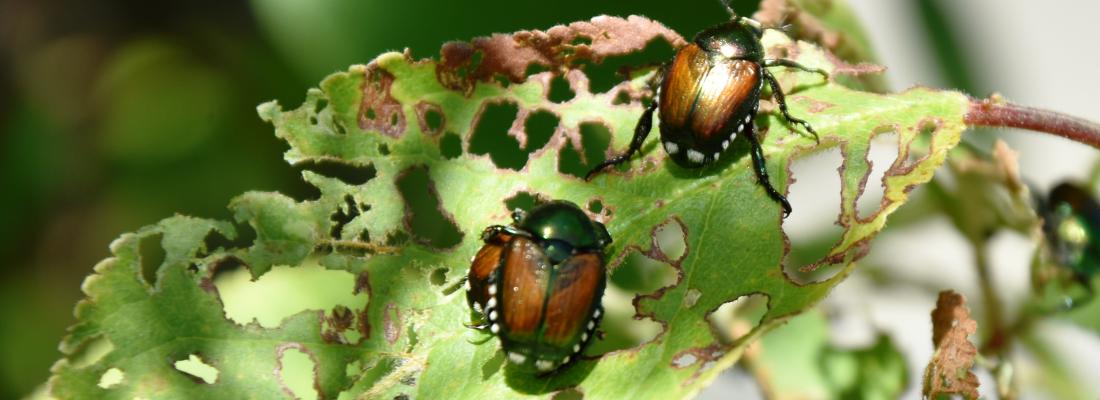Biodiversity Reading time 3 min
IPM-Popillia, a European project to control the Japanese beetle
Published on 14 October 2020 (date.last_update 22 June 2022)

Native to eastern Asia, the Japanese beetle, Popillia japonica, is a pest that was accidentally introduced to mainland Europe and detected in the Milan region in 2014. It is easily spread by the movement of goods and people and is a serious threat to the entire agricultural sector (over 300 host plants), urban landscapes (private gardens, lawns, parks, etc.) and biodiversity in invaded areas. The prevention of the invasion of the species comes up against two constraints: the options for the restriction of the movement of goods and people are limited, and the eradication of the population established south of the Italian-Swiss border is impossible.
In this context, it is essential to implement measures to control the propagation of the insect, and to contain the increase in population density in order to limit economic losses. The "Integrated Pest Management of the invasive Japanese Beetle, Popillia japonica - IPM-Popillia" Horizon 2020 project develops these measures and relies on a consortium of 13 European partners to carry out research intended to be applied in the short term, such as appropriate containment arrangements. In the longer term, IPM-Popillia aims to establish an integrated strategy for the control of P. japonica at the level of the European continent based exclusively on environmentally-friendly control measures, and to produce knowledge that makes it possible to better prepare for future similar pest outbreaks.
Two research units from the Plant Health and Environment (SPE) division are involved in this European project coordinated by Giselher Grabenweger (Agroscope, Switzerland). The Institute for Genetics, Environment and Plant Protection (IGEPP) unit coordinates the section dedicated to the study of the entry and propagation pathways of the Japanese beetle. It is also working on the design of an optimal surveillance strategy that allows the early detection of P. japonica in Central Europe, in close collaboration with the Biostatistics and Spatial Processes (BioSP) research unit.
The IPM-Popillia project launch seminar will be held on October 15th and 16th, 2020 in Florence (Italy) and will be broadcast simultaneously by videoconference. It brings together the 13 European partners of the project, including INRAE.
AN APP TO REPORT SIGHTINGS
The Japanese beetle is a quarantine pest. if you observe one, you must report it to the authorities. A first concrete application of the IPM-Popillia project facilitates reporting sightings of this invasive insect. Already available on Android and iOS, in English, Portugese and German, this citizen science smartphone app is on the Spotteron platform. The French version will be available on 1 July 2022 and Italian will follow. The app reports the presence of the Japanese beetle (location, crop or other plants infested, estimated number of beetles, weather conditions, etc.) and sends the report directly to the authorities of the region concerned.
> Download the app: https://www.popillia.eu/map

This project has received funding from the European Union’s Horizon 2020 research and innovation programme under grant agreement No 861852
https://cordis.europa.eu/project/id/861852/fr
